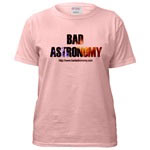
| Bad Astronomy |
|
|
|
BA Blog
|
|
Q & BA
|
|
Bulletin Board
|
| Media |
|
|
|
Bitesize Astronomy
|
|
Book Store
|
|
Bad Astro Store
|
|
Mad Science
|
|
Fun Stuff
|
| Site Info |
|
|
|
Links
|
| RELATED SITES |
| - Universe Today |
| - APOD |
| - The Nine Planets |
| - Mystery Investigators |
| - Slacker Astronomy |
| - Skepticality |
Buy My Stuff

Keep Bad Astronomy close to your heart, and help make me
filthy rich. Hey, it's either this or one of those really
irritating PayPal donation buttons here.
A Bad Twofer
January 22, 2001Today we have two Bad News articles for the price of one (free, that is).
The first is care of the MSNBC website and Newsweek. The article in question is actually pretty good, talking rather humorously about several recent discoveries in astronomy. The problem is in the image caption along with the article: ``Within the newly discovered galaxy named DA15456 exists the largest planet ever found'' This is wrong for two reasons. The first one, and the bane of my life, is the mistaking of ``galaxy'' for star. This mistake is so common I'm actually getting kind of tired of talking about it.
The discovery in question is of either a very large planet or a very small star orbiting the star DA15456. Either way it's interesting, because we don't really understand the details of how planets and stars form, and something this big so close to the parent star is odd. But the parent is definitely a star, and not a galaxy!
Actually, another funny thing is the picture that goes with the caption: it's a nice image of a field of stars, galaxies and quasars taken by my colleague and friend Gerry Williger. Many of the objects in the image appear to be at the same distance, indicating they are part of the largest structure ever seen in the early Universe. That's pretty neat, and funny that the caption is about a completely different discovery.
My thanks to an anonymous Bad Reader for letting me know about this. You know who you are.
The second part of our twofer involves a rather odd concluding paragraph on the CNN website. An article about a new telescope starts off well enough. The telescope is designed specifically to look for signals from extraterrestrials, as part of SETI (the Search for Extraterrestrial Intelligence). It's an unusual idea, but not nearly as odd as the last paragraph of the article.
The reporter gives a brief timeline of advances with SETI, then concludes with this gem: ``In October, 1989, a Russian news agency reported that scientists claimed to have established that a city in the former Soviet Union had been visited briefly by a spaceship crewed by three feet tall humanoids and a robot.''
Um, what? Where did this come from? That paragraph is almost as far out as the aliens it talks about. It's not exactly astronomy, but then, I'm not sure what it exactly is!
Thanks to Bad Reader Ash Young for this slice of the weird.
|
|
|
|